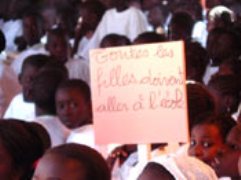Senegal is pilot in new UNESCO and Procter and Gamble partnership

- ©UNESCO (Senegal)
Senegal is the first country to participate in a new partnership launched today between UNESCO and the multinational consumer product company Procter & Gamble’s Always brand. The partnership aims to promote education for young girls and young women.
In Senegal, educational kits and digital resources will be made available to train and support more than 1,200 teachers who will devote 600 hours of literacy and life skills teaching to girls in Senegal. The project is to be implemented in the regions of Diourbel, Fatick, Kédougou, Matam, Saint-Louis and Tambacounda.
Aïssa Maïga, the Senegalese-born French actress, is the “Godmother” of the Always-UNESCO Literacy Project for Young Girls and Young Women in Senegal, which is financed from a percentage of sales generated by some of the corporation’s Always feminine hygiene products in France and via a dedicated Facebook page.
Less than 45 % of women could read or write in Senegal, according to data from 2006.
50 % better chance of surviving
“A major world corporation like Procter & Gamble can give added impetus to our drive for global literacy,” said the Director-General of UNESCO, Irina Bokova. “UNESCO warmly welcomes the commitment of private business to support literacy among girls and women.”
Two facts can be used to illustrate the importance of improving the rate of literacy among girls: HIV/AIDS spreads twice as fast among illiterate girls and women as it does among those some literacy skills. A baby born to a literate mother has a 50% better chance of living to the age of five than one born to an illiterate woman.
Members of the public are invited to support the project by liking it on Facebook
UNESCO Press Release No.2011-121
- 09-09-2011

